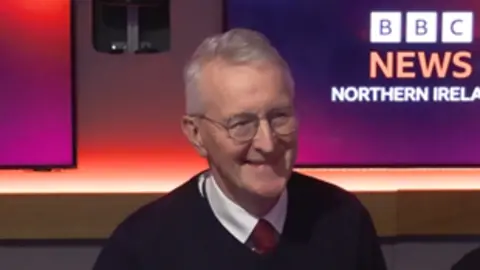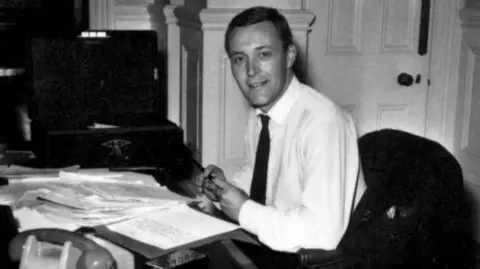NI like the rest of UK but completely different - Benn
 BBC
BBC"People ask me what is Northern Ireland like, and I say it's just like the rest of the United Kingdom, except that it's completely different"
Almost six months after being appointed to the role of secretary of state for Northern Ireland, Hilary Benn can still joke about a cabinet post which involves dealing with a fair share of controversy.
From issues around the redevelopment of Casement Park and the Legacy Act to helping ensure the lights stay on in Stormont – it's far from a straightforward job.
Whilst spinning the record discs and chatting to William Crawley on BBC News NI Talkback's Christmas special episode, Benn said he had enjoyed his time in the role so far.
Early life
Benn was born and raised in London, to parents Tony and Caroline Benn.
His father was a prominent Labour MP on the left of the party who served in the cabinets of Harold Wilson and James Callaghan.
Benn said that when he was growing up, his experience of the Troubles - like many others in Great Britain - was through the lens of the media.
"I grew up reading about the Troubles, watching the Troubles reported on the news," he said.
"If someone had tapped me on the shoulder that moment and said: 'I know it looks bad, but one day Martin McGuinness and Ian Paisley will sit side by side with each other as deputy first minister and first minister', I would have said to that person, I'd love to see it, but I'm not going to live that long," he said.
'You assume that all families are like your own'
Benn's father was not the only member of the family who was involved in politics.
Every Labour prime minister has had a Benn in his cabinet.
Benn's father, who died in 2014, was a renowned speaker and had a huge influence on the left of the party.
Young Hilary never had a chance; he was destined for a career in politics.
"When you are little you assume that all families are like your own, as it's the only one you know," he said.
"We would talk about what was going on in the world when we sat down as a family to eat. Mum and dad would encourage that.
"Then gradually, as I got older, I realised what dad did and why people appeared to be interested in what he did."
 PA Media
PA MediaBenn told Talkback that one of the most profound moments of his early years was witnessing his father take on the British establishment - and winning.
When Tony Benn's father died in 1960, he was blocked from being a member of Parliament because he was the son of a hereditary peer.
When his father died, he inherited the title of Viscount Stansgate and with it a seat in the House of Lords.
As a result, the law required him to quit the House of Commons, where he had held a seat as an MP for 10 years.
Despite winning a subsequent by-election in Bristol South East in April 1961 for his own vacant seat, he was still barred from the Commons.
"He fought a campaign and was described in the press as the 'consistent commoner and the reluctant peer', and there was quite a lot of public support," Benn told Talkback.
In part due to Tony Benn's campaigning, Parliament eventually introduced the Peerage Act 1963 to allow hereditary peers to renounce their titles.
The very same day that the act became law, Tony Benn did just that.
Three weeks later he regained his seat in the Commons.
"That had a huge influence on him because he had taken on the British constitution and the establishment and had changed the law," Benn said.
"It had a very, very powerful effect on us as children as part of the family story."
'I would let him smoke his pipe'
With over 45 years of his life dedicated to politics, Benn's journey to Westminster was not a straightforward one, despite his family's history in the Labour Party.
As the Labour candidate in the Ealing North constituency, he suffered defeats in 1983 and 1987.
It wasn't until 1999 that he eventually got elected for Leeds Central.
Benn also served in the cabinet from 2003 to 2010 under Tony Blair and Gordon Brown.
He and his father briefly served together in the House of Commons, until the 2001 general election.
"We had this agreement where he would drive me home at night from the Commons and the deal was that I would let him smoke his pipe, he would let me have the window open so I could breathe, and he would agree to wear his seatbelt," Benn said.
You can listen to the full interview on BBC Radio Ulster's Talkback programme at 12:00 GMT on 30 December or listen live or afterwards on BBC Sounds.
